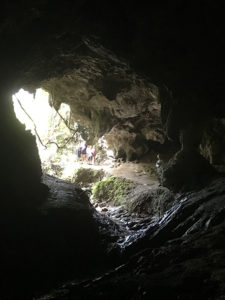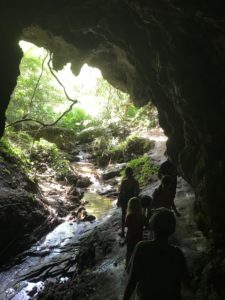 There is a deep, dark cave in Okinawa, Japan with a history that speaks to me. It’s hidden among the vines and thick green branches of a jungle that looks almost fake, straight out of an old Swiss Family Robinson movie set. The warning signs of venomous Habu pit vipers add to the drama. The humidity and heat combine to feel like a sauna, but the trickling sound of the creek echoing as it makes its way into the cool of the cave beckons its visitors onward.
There is a deep, dark cave in Okinawa, Japan with a history that speaks to me. It’s hidden among the vines and thick green branches of a jungle that looks almost fake, straight out of an old Swiss Family Robinson movie set. The warning signs of venomous Habu pit vipers add to the drama. The humidity and heat combine to feel like a sauna, but the trickling sound of the creek echoing as it makes its way into the cool of the cave beckons its visitors onward.
After stopping to examine the pit viper warning sign, seven laughing, skipping children raced to be the first into the cave, but as they turned the corner of the path, they stopped, wide-eyed with wonder. The mouth of the cave was massive, and the darkness beyond it full of mystery. My sister, Christy, followed setting down her backpack to pull out head lamps and flashlights.
In the midst of the scattering kids, it was hard to miss the solid monument standing on the edge of the darkness. There were Japanese characters inscribed on its smooth stone, wilted flowers at its base, and ribbons carefully draped over it. The cave is called Shimuku Gama, or “Happy Cave.”
In 1945, the island of Okinawa was a wasteland of war. The surviving Okinawans described their experience as a “typhoon of metal.” Machine guns ripped through trees until there were none, and bombs turned forests, villages, and historic landmarks into rubble. Running for their lives, over a thousand people hid in the damp darkness of that cave.
Just as terrifying as the metal raining down on them were the lies of the Japanese soldiers. They told the Okinawans that the Americans would mercilessly kill all of them after raping their women. Suicide, they were told, would be better than being captured by the “beasts”.
Seventy-three years ago, when the American soldiers approached the same mouth of the cave where our children found wonder, they set up a machine gun and shouted into the darkness. Terrified voices echoed through the cave as families pulled out grenades to die together and others reached for poison. In the midst of the terror, Heiji and Heizo Higa shouted above the noise. They had the truth.
Heiji worked in the sugarcane fields of Hawaii, and his nephew Heizo worked as a Hawaiian bus driver. They knew Americans, so with terror mounting, they shouted out the truth, convincing the people the Americans would not kill unarmed civilians. The people listened. Grenades and poison were left behind as they walked out of the cave. The monument we saw, so beautifully decorated with ribbons and flowers, was placed there to honor the brave actions of Heiji and Heizo.
 People left the darkness in 1945, and the Americans, the ones they were told would be “beasts,” gave them shelter and food, but with butterflies pinging off the walls of our stomachs and nervous laughter, so many years later, we moved into it. Beams from our flashlights danced on the stalactite-covered ceiling as we stepped carefully through streams and over rocks. I told 6-year-old Ally I needed someone to help me through the cave. She took my hand, and every few steps shot her flashlight at another stalactite shouting, “Watch your head,” authority booming from her little voice. With every flat area we passed, every smooth rock that might have worked as a bed, I thought of families huddled around candles desperate to survive. Crawling through a narrow passageway, where the ceiling dipped low, we found another cavern. Flashlights sparkled on the water moving past us.
People left the darkness in 1945, and the Americans, the ones they were told would be “beasts,” gave them shelter and food, but with butterflies pinging off the walls of our stomachs and nervous laughter, so many years later, we moved into it. Beams from our flashlights danced on the stalactite-covered ceiling as we stepped carefully through streams and over rocks. I told 6-year-old Ally I needed someone to help me through the cave. She took my hand, and every few steps shot her flashlight at another stalactite shouting, “Watch your head,” authority booming from her little voice. With every flat area we passed, every smooth rock that might have worked as a bed, I thought of families huddled around candles desperate to survive. Crawling through a narrow passageway, where the ceiling dipped low, we found another cavern. Flashlights sparkled on the water moving past us.
“Hey guys, come over here,” Hope shouted. “Let’s turn off our lights.”
The little ones pleaded, “Nooo!” as the older cousins eagerly complied, excited to feel darkness.
With a little convincing, the lights were finally off. “Guys, let’s be quiet,” my sister suggested. Feet shuffled in the rocks, and we stood there a moment, in the silence, interrupted only by the sound of trickling water and an occasional drip from the ceiling.
Then Christy began to sing. “Amazing grace, how sweet the sound. . .” Her voice was loud and strong, echoing off the cavern walls, and we all joined her, little and big voices together in the darkness, “. . .that saved a wretch like me. I once was lost but now I’m found, was blind but now I see.” We could “see,” even in the midst of complete darkness, because somewhere in our stories, God loved us too much to leave us blinded by lies. The singing stopped, and lights were turned back on. God was there in the darkness, bending close to listen, just as He was there so many years before with those people so paralyzed with fear.
“That was cool guys!” I shouted amidst the splashing and laughter of the little explorers.
When we finally made our way back, the sunlight was beautiful. The green trees and blue sky were more vibrant than they were before. We all have lies, like Habu snakes, slithering towards our hearts; they trap us in our caves. Kids hide in public-school bathrooms at lunch taking bites from a sandwich. The bathroom is their cave, and the lie that they have no value keeps them there. Others believe there’s no way out. The darkness is too much, and like the Okinawans, they consider ending it all. Some of us, however, like the song says and by God’s grace, can “see.” We have lies that we battle, but we know the way out of the cave. We know the truth.
1 Peter 2:9 says, “But you are a chosen people, a royal priesthood, a holy nation, God’s special possession, that you may declare the praises of him who called you out of darkness into his wonderful light.”
God doesn’t want us in caves. He graciously calls us into His marvelous light, into the truth that we are his special possession, chosen by Him. Embracing the truth, even shouting it out like Heiji, Heizo, and my sister is a celebration of that grace and an act of worship. As we do that, we will not only find our way out of our caves; we might just bring a few others along with us.
Experience the darkness and adventure of the cave with my family and I as we explore the Happy Cave via video.
Or, join the conversation and share what lies you feel are common today that keep us stuck in our caves.




Thank you for the blog. I was one of the people that was caught up in the darkness of unbelief, unloved and mistreated. Then I became a child of God when I was told the truth of God’s love for me and I realized I was a princess, the child of the king and bought with a high price. Praise God and his amazing grace.
Such an amazing post, Erin! I was moved to tears…thank you for sharing your thoughts!
Very deep and meaningful, your an amazing writer and an even more amazing teach Mr Ahnfeldt.
Erin you did it again. Thank you. I hope your students read your blog to know the heart of you. ❤️